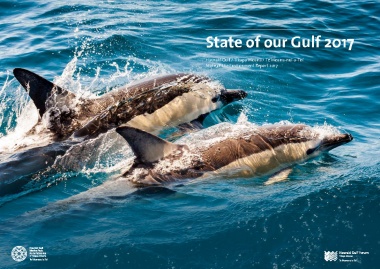State of our Gulf 2017
Author:
Hauraki Gulf ForumSource:
Hauraki Gulf ForumPublication date:
2017Topics:
EnvironmentFrom the Executive Summary:
The Hauraki Gulf / Tīkapa Moana / Te Moana-nui-a-Toi1 has been transformed over the last two human lifespans. Native terrestrial species have been driven to extinction, native forests and vast wetlands have been cleared and replaced with pastoral land or urban development, water quality has been greatly reduced by contaminants and sediment, ecologically important marine habitats have been destroyed, fish populations have been greatly depleted, and te ao Māori (the world of Māori) has been ruptured. Damage caused by boom and bust industries, such as mining, native forest logging, and mussel dredging has left a lasting environmental legacy. These historical effects have been compounded by ongoing development, commercial activity and a growing demand for the Gulf’s treasures.
Previous State of the Gulf reports (2011, 2014) found that most indicators pointed towards ongoing environmental degradation, with resources continuing to be gradually lost or suppressed. The reports called for bold, sustained, and innovative steps to be taken to improve the management of the Gulf’s resources and halt progressive environmental degradation.
In response, the Hauraki Gulf Forum developed a strategic framework for action and urged agencies to work collectively on making urgent progress in the following areas:
- A regenerating network of marine protected areas and island sanctuaries
- Enhancement of fisheries with improved environmental outcomes
- Mana whenua relationships reflected in resource management practice
- Active land management to minimise inputs of sediments, nutrients and contaminants
- Knowledge utilisation within an ecosystem-based management framework
Much has happened since 2014. This report catalogues those changes, and considers progress made on integrating management and achieving the strategic outcomes sought by the Forum.
December 2017
